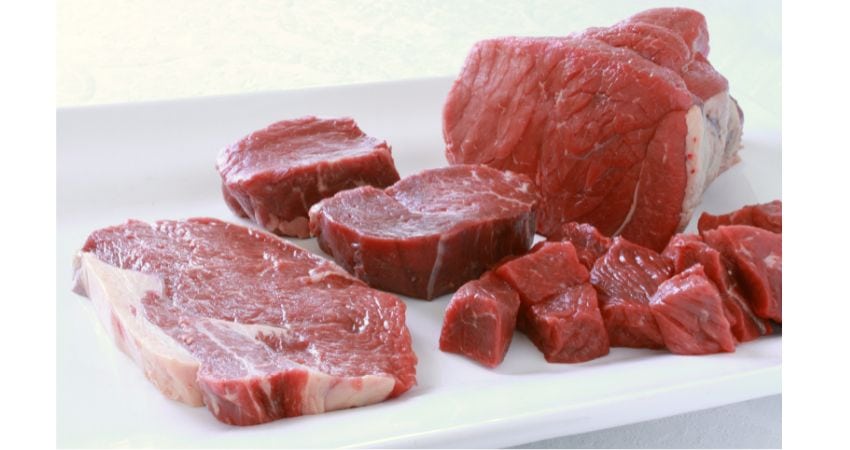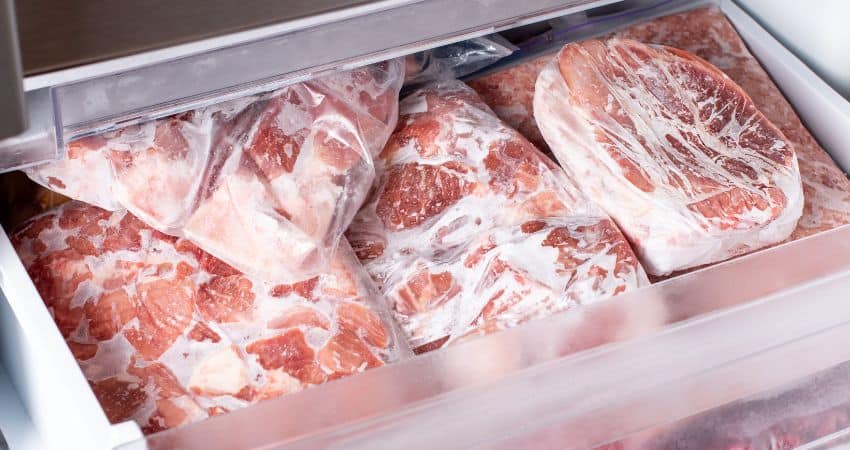Reasons Why Storing Meat Is Important
Why is it important meat is stored in the refrigerator?
Reasons why storing meat is important:
- It lowers the risk of food poisoning.
- Storing meat slows down bacterial growth.
- It stays fresh for longer.
- Storing it helps preserve the flavor and texture.
- It slows down the loss of nutrients.
- Storing the meat keeps it ready for cooking.
This article will examine each reason in more detail. First, let’s learn the reasons why storing meat in the refrigerator is important.

Why Should Meat Be Kept in a Refrigerator?
As a Certified Health Coach many clients ask me about food storage including meat. Therefore, I have researched this topic in the past and present. I consume and store it myself. Let’s examine the storage methods and why they’re important.
There are a few ways to store meat. Meat storage is important, therefore, it’s crucial to know how meats should be stored.
Meat should be stored in a refrigerator to keep it fresh longer, prevent spoilage, conserve nutrients, keep the texture and flavor. If meat is not kept in the refrigerator, it will start spoiling causing an upset stomach or food poisoning.
There is no reason to keep meat out of the refrigerator. If it is left on the table too long, bacteria will spoil the meat quickly. The FDA states meat can only last about 2 hours at room temperature, after which it’s no longer safe for consumption1.
To keep your family and guests safe, keep the meat in the refrigerator, even when it’s cooked.
Speaking of cooked meat, store leftover chicken, pork, beef, veal and turkey in an airtight container for between 3 and 4 days2. If you cooked up a huge amount, you can’t eat within that time window, store it in the freezer.
After freezing, the texture and flavor won’t be perfect, but it’s still better than creating food waste. If you’ll be freezing meat, you may want to check out my article about it, 7 Ways To Store Meat In The Freezer Without Plastic.
Note that all meats are not equal. Here is a handy table of various meats and how long they can be kept in your refrigerator3.
Refrigeration Meat Storage Guidelines
| Meat | Type | Refrigerator (40F or Below) |
| Salad | Chicken or Tuna | 3 to 4 days |
| Hot dogs | Opened Unopened | 1 week 2 weeks |
| Luncheon meat | Opened or deli sliced Unopened package | 3 to 5 days 2 weeks |
| Bacon and sausage | Bacon Raw Sausage Sausage fully cooked Sausage purchased frozen | 1 week 1 to 2 days 1 week After cooking, 3-4 days |
| Ground Meats & ground poultry | Hamburger, ground beef, turkey, chicken, veal, pork or mixtures | 1 to 2 days |
| Fresh beef | Steaks Chops Roasts | 3 to 5 days 3 to 5 days 3 to 5 days |
| Fresh Poultry | Chicken or turkey | 1 to 2 days |
| Soups or stews | Meat added | 3 to 4 days |
| Leftovers | Cooked meat or poultry | 3 to 4 days |
Now let’s talk about why you should store meat properly.
Reasons Why Storing Meat Are Important
1. It Lowers the Risk of Food Poisoning
Raw meat has a very high risk of spoilage, but if you store it in the refrigerator, it can stay for 1–2 days.
Eating spoiled meat can result in the following infections:
- Anthrax
- Salmonellosis
- Trichinosis
- Brucellosis
- Bovine Tuberculosis
It won’t cause extreme harm if the refrigerator temperature is kept at or below 40°F4 .
If you’ve experienced food poisoning before, you’ve felt how horrible, painful and exhausting it can be5.
A friend once ate some barbecued meat that came off the grill 3 hours earlier. It was so delicious, and he didn’t notice anything. Unfortunately, he woke up that night and vomited about four times. It took him a couple of days to return back to normal.
Therefore, trust me when I say to throw away any cooked or uncooked meat kept at room temperature or in the refrigerator for too long.
2. Storing Meat Slows Down Bacterial Growth
The way the refrigerator keeps the meat from spoiling to quickly is by hindering the reproduction of microorganisms.
But how does cold temperature stop bacterial growth? A study on the effect of low temperatures on microbial growth explains microorganisms can’t extract anything from the meat when the temperature is too low6.
In other words, the bacteria and other microbes die out from starvation. While they might not exactly die, they can’t reproduce either, which means it won’t spoil as fast.
This also means the lower the temperature the refrigerator is set at, the better. No wonder why the freezer can keep it fresh for a month or two.
When storing the meat in the refrigerator, place it in an airtight container. A study on airborne bacteria in slaughterhouses revealed separating it is key to decreasing the risk of food poisoning7.
In addition, raw meat should be kept at the bottom of the refrigerator and away from fresh foods to prevent cross-contamination.
3. Meat Stays Fresh for Longer
Both cooked and uncooked meat isn’t fresh and edible after only a few hours at room temperature. Therefore, if you keep it in the refrigerator, it’ll stay fresh and taste the same for days.
You can throw uncooked meat into a marinade and leave it in the refrigerator for a day or two.
Spicy chicken wings can only get better the longer they marinate, and the same goes for beef and pork. The refrigerator is a nice compromise between room temperature and the freezer.
If there’s sauce on the meat, the spices could penetrate it deeper, making it taste even better.
4. Storing Meat Helps Preserve the Flavor and Texture
Meats usually don’t change their flavor and texture much in the refrigerator, but this isn’t the case with freezers. This is so because the molecules expand and shrink as they cool and thaw.
That process destroys the cellular walls, even when it’s freshly frozen.
I’m not saying you shouldn’t freeze it, though. I have a few organic, lean burger patties in the freezer right now.

Beef Stew with potatoes can be frozen but one of its main ingredients has to be removed first. Read about it in my article, Can Beef Stew With Potatoes Be Frozen?
Nonetheless, keep it in the refrigerator whenever possible. The flavor and texture will stay the same as on the day it was cooked.
5. It Slows Down the Loss of Nutrients
Meat oxidizes when it’s out for too long. You might’ve seen it yourself when you visited your local butcher or at home. The meat turns an unappetizing grayish-brown color.
This is called lipid oxidation, and it significantly affects the flavor, texture and nutrients in the8. The vitamins and minerals degrade during this process.
You can prevent it by putting it into the refrigerator as soon as you get home.
6. Storing the Meat Keeps It Ready for Cooking
Having some meat on hand is convenient if you don’t feel like going out. Or maybe it’s a holiday, and the stores aren’t open. This applies to both the freezer and the refrigerator.
If you’re planning to eat a steak in the next few days, take it out of the freezer in enough time for it to defrost. The best way to defrost meat is to transfer it from the freezer to the refrigerator until it’s fully thawed.
Cooking frozen meat isn’t impossible, but it’s not recommended, messy and the surface of it gets overcooked.
In addition, cooked meat can be frozen and defrosted when ready to eat it again.
If you have any questions to ask me about this article don’t hesitate to comment below or email us. You can find an email on our contact page.
Read Next – More Food Storage Articles!
How To Store Your Eggs In Lime Water
7 Ways To Store Meat In The Freezer Without Plastic
- FDA: Serving Up Safe Buffets [↩]
- USDA: How long can you keep cooked beef? [↩]
- FoodSafety.gov: Cold Food Storage Chart [↩]
- USDA: “Danger Zone” (40ºF – 140ºF) [↩]
- Wikipedia: Meat spoilage [↩]
- Oxford Academic: Effect of low temperature on microbial growth: lowered affinity for substrates limits growth at low temperature [↩]
- National Center for Biotechnology Information: Airborne bacteria and carcass contamination in slaughterhouses [↩]
- Springer Link: Lipid oxidation in meat and meat products – A review [↩]
